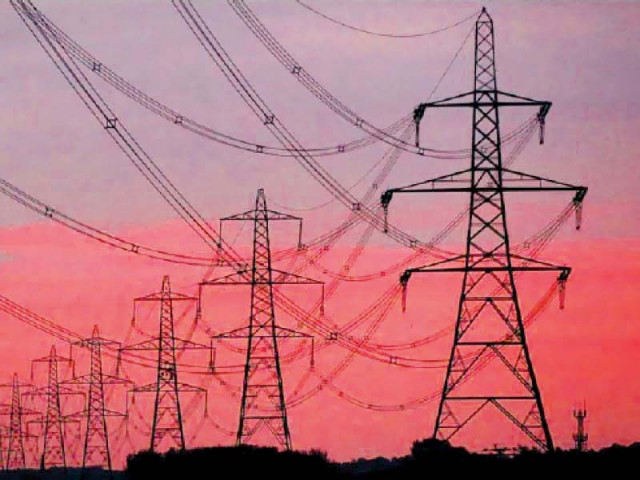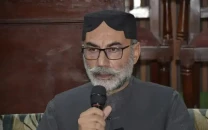Cabinet proposes Re1 cut in power tariff
Turns down energy ministry’s request not to decrease prices

The federal cabinet on Tuesday approved a Re1 per unit cut in electricity prices for a three-month period while turning down a request by the energy ministry not to decrease the prices due to weak financial conditions of the power distribution companies.
But the government has decided to introduce a legislation to fix gas prices on the basis of average domestic and international gas purchase price that will jack up rates by 30% for all categories of consumers.
The cabinet has rejected a proposal of the energy ministry and approved the recommendation of the National Electric Power Regulatory Authority (Nepra) to reduce electricity prices by 0.991 paisas per unit, Information Minister Fawad Chaudhry told The Express Tribune after a meeting of the federal ministers with media persons.
The meeting had been arranged to apprise journalists and anchorpersons of the government’s position on the State Bank of Pakistan Amendment Bill, 2021 and the Rs375 billion mini-budget. But the objective apparently could not be achieved as the ministers were not in a mood to listen and rushed from the venue after giving their side of the story.
The federal cabinet took up a summary of the Ministry of Energy to take a decision whether to notify the price reduction by Re1 per unit or withhold the decrease due to thin position of the companies.
Nepra had determined the periodic adjustment for the fourth quarter of FY 2020-21 and intimated the same to the federal government prior to its notification with proposed uniform decrease of Re1 per unit across categories excluding lifeline and protected consumers, to be recovered in three months period with effect from February 2022.
The energy ministry was of the view that the fourth quarter of FY 2020-21 may also be applicable for 12-month period keeping in view the current applicable QTAs and implementation of Subsidy Reform Phase II already approved by the cabinet.
The ministry further stated that in order to fund the subsidised electricity prices for those using less than 300 units a month, the benefit of negative quarterly tariff adjustment determined by Nepra for the fourth quarter may not be passed to non-time of use by domestic non-protected consumers consuming less than 300 units.
While speaking to media persons, Energy minister Hammad Azhar said the government would introduce a bill in parliament next week to seek approval for introduction of weighted average cost of gas (WACOG) for sale of local gas and imported liquefied natural gas.
The minister said that due to depletion of domestic gas reserves and high cost of imported gas, the government was not in a position to provide piped gas at current rates.
At present, the imported cost of LNG is about Rs8 billion per cargo against which the gas companies could recover only Rs1 billion from residential consumers, the minister said. On a supply of just 2% of the imported gas, the gas companies have already faced about Rs100 billion losses in the last three months while the government cannot divert more LNG to residential consumers. Otherwise, the gas companies would go bankrupt, he added.
Azhar said gas-producing provinces were opposed to inclusion of LNG in average pricing as they wanted to supply local gas to the districts where it was produced but now both Sindh and Khyber-Pakhtunkhwa were heading towards gas shortage.
He said that K-P’s production was hardly sufficient to meet its own needs while Sindh would also face similar situation in the next three years. The solution is to increase import of gas and sell at a price that is financially viable for companies, he added.
Azhar said Sindh also understood the importance of the weighted average cost but because of political reasons, it would not openly support it. Azhar said that on an average, the gas prices for all categories of consumers would go up by about 30% but the government would pass on the increase gradually while also protecting the current domestic consumer slabs.
He said the gas shortage did not emerge suddenly but has been developing over the years. Therefore, PPP Prime Minister Yousuf Raza Gilani had imposed a ban on new connections in 2011 which slowed down the shortage. The ban was, however, removed by the PML-N in 2017 and now the country has gas only for next 10 years. He said successive governments tried to reform the gas pricing but failed.
The minister said the total local gas allocation at present was about 4,000 million cubic feet per day (MMCFD) but this was down to 3,500 mmcfd because of about 9% annual depletion of local gas fields. On the other hand, gas demand in domestic sector goes up by five times to about 2,000 mmcfd in winter, leaving just 1,500 mmcfd for other sectors including industry, fertiliser, power etc.
While speaking at the occasion, Finance Minister Shaukat Tarin explained the rationale of introducing the SBP amendment bill and the mini-budget. Tarin said that the government has decided to take up the issue of imposition of 17% sales tax on infant formula milk and the bread sold at bakeries with the International Monetary Fund. He said that the government would try to convince the IMF not to impose the tax on these two consumable items.



















COMMENTS
Comments are moderated and generally will be posted if they are on-topic and not abusive.
For more information, please see our Comments FAQ